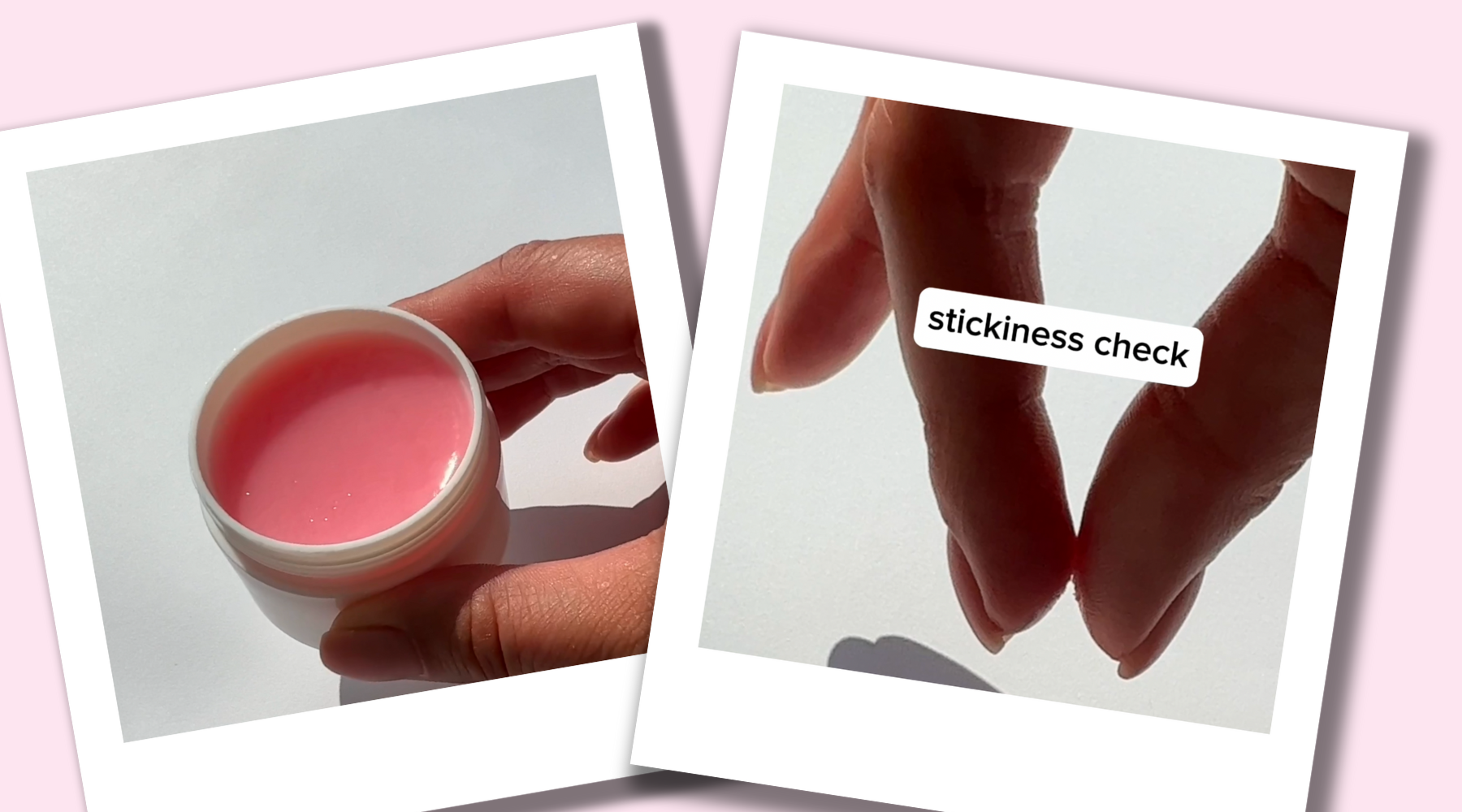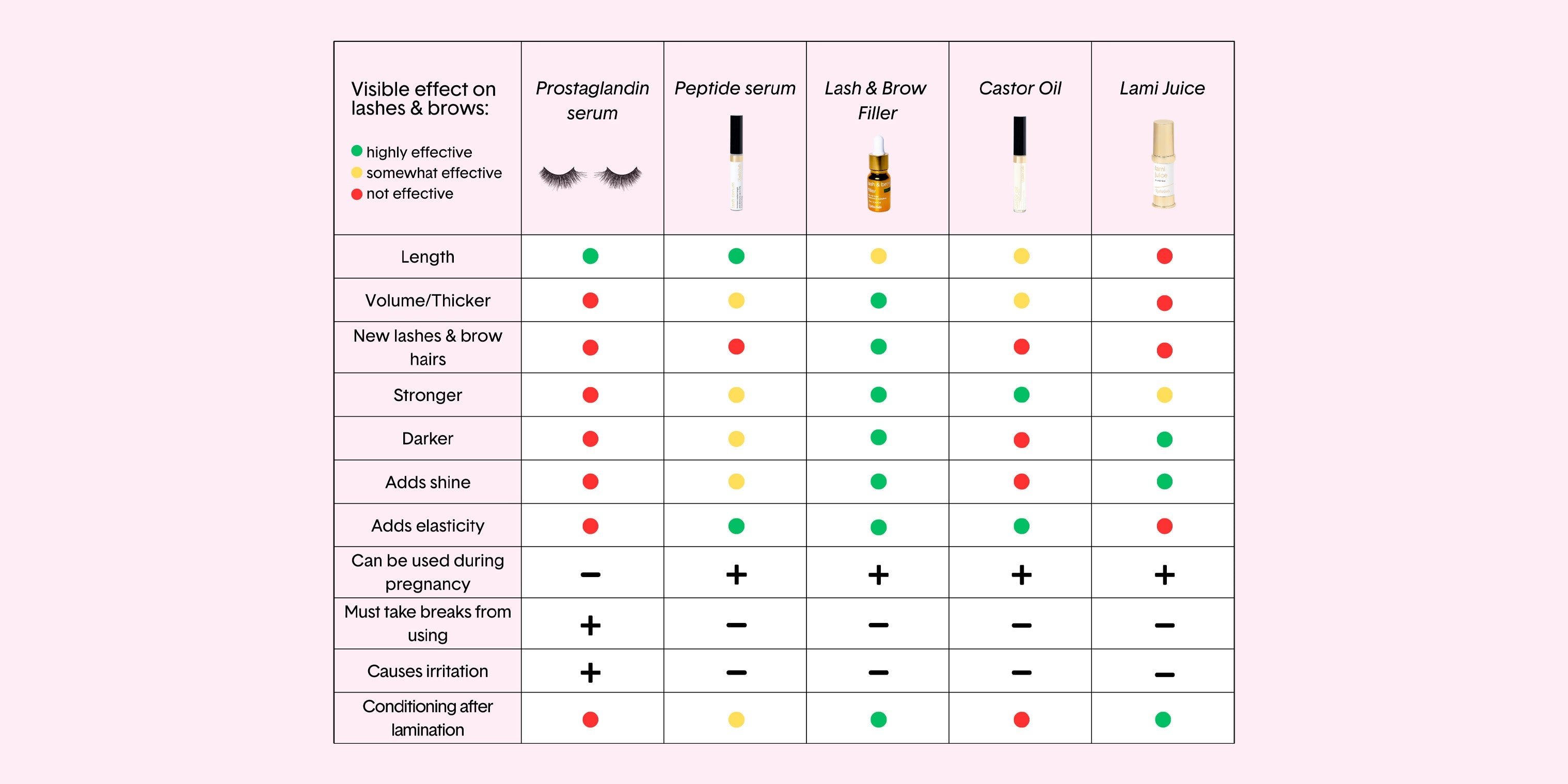Step-by-Step Guide to the Original Cysteamine Lash Lift
Table of contents
Step 1: Clean customer's lashes
For the best lash lift result, clean the lashes yourself — whether or not the client is wearing makeup. You simply see more (and better) than she does in the mirror.
Apply cleansing foam onto the eyelid (not straight onto the lash line for comfort), then cleanse thoroughly from the roots using a brush that really gets in there (like a lip wand). Remove most of the residue with a damp cotton pad, then have the client tilt her head to the side so you can rinse off any remaining residue from the lash lift treatment.
Always rinse with saline (not distilled water): it's less irritating because it's closer to tear pH, and the salts gently open the cuticle, helping the lash lift lotions absorb better.
Step 2: Apply Easy Lift Primer (optional)
Easy Lift is used to:
- Speed up processing
- Soften the lash structure so wrapping on the shield is easier (and less glue-dependent)
- Open cuticles without the dehydrating effect typical of many primers
Only use Easy Lift with gentle lash lift lotions — it enhances the lifting effect and may lead to over-processing if combined with stronger systems.
When Easy Lift is especially useful:
- Very coarse lashes that keep wanting to pop off the shield
- Speeding things up, especially when your lifting lotion pump has been open for around 1.5 months, and performance slows due to oxygen exposure
Pro Tip: Use a tapered long-tip micro brush for faster application and more even distribution. Apply generously to fully coat lashes from root to tip (top and bottom), avoid flooding the eyes, wait ~30 seconds, and do not rinse.
Step 3: Separate the False Lash Layer
Separate lashes growing in the "false lash layer" — the few odd lashes that grow above the main layers. These interfere with the proper placement of the silicone shield during a lash lift and create kinks when lifted.
Step 4: Glue-Free Lash Lift Silicone Shields
Glue-free shields are the latest standard in lash lift silicones. Their shape and silicone material let them adhere without glue, making application and clean-up faster and easier.
Important: Place the shields as close to the lash line as possible without touching the lashes. Always check this distance before continuing:
Step 5: Comb Lashes onto the Shield and Isolate
To make this lash lift step genuinely fast and easy, use a balm-style adhesive (like Flash Balm) with a Wide Lami Brush.
Advantages of using Flash Balm during lash lifts:
- Faster, easier lash control - doesn’t dry out like traditional glues
- No need to increase processing time (a common drawback with most balm glues)
- Helps prevent even thick lashes from popping off
- Lets you re-adjust lashes at any point, thanks to the balm consistency
Workflow
1) Apply a thin, even layer onto the outer part of the shield
2) Pick up a bit more glue to wrap lashes on the silicone. Hold the shield steady with your fingers while combing to prevent shifting
3) Inner corner: comb lashes straight up (90° angle in relation to the shield)
4) Outer corner: comb lashes straight up, or slightly outward only for exceptionally long lashes (for a cat-eye effect, but it can reduce lift intensity)
5) Comb firmly: weak attachment means more loosening later and a weaker lift
Important: Watch for waterline flipping, which can happen when lash lift silicone shields are placed too far from the lash line, and lashes are pulled up too hard. This flipping weakens the curl. Check the distance from the lash line like this:
If you spot flipping late (after lashes are glued), gently loosen them, reposition the shield, and start over.
Step 6: Cysteamine Lifting Lotion

Option 1
Start application at the outer corner by mapping the top line first using a precise Angled Lotion Brush. Since outer lashes typically need more time, this helps achieve even results.
Only the area covered with product will lift, so keep that top line neat to avoid uneven lifts.
Then, fill from that top line down to the shield's bottom edge. Because our lash lift lotions are gentle, you can apply close to the lash line — aim for 1 mm or less. Leaving a wider gap weakens the lift.
Option 2
Cover lashes from base to tip, starting at the outer corner. Apply a thicker layer toward the base because more product = faster processing.
If any lashes pop off, secure them with a Compensator.
Processing time: 8 to 15 minutes, typically ~10 minutes.
When should I remove the lifting lotion?
Manufacturer timings are a general guide. You must check the lashes each time, since factors like lash thickness, density, and previous lash lift treatments affect how long they need.
Remove the lotion when lashes bend easily into a V-shape during the lash check.
Use a damp Angled Brush to remove the lotion, then use a dry Q-tip or lip wand to clear any residue.
Important: Cysteamine is stickier than TGA and keeps working until fully removed — clean lashes thoroughly before moving on.
Step 7: Lash Lift Fixing Lotion
Important: If lashes lift or shift during lifting or lotion removal, re-secure with balm before applying the fixing lotion.
Apply from the inner corner first, as those lashes are finer and process faster — this helps achieve even curl across the lash line.
Apply fixing lotion slightly wider than the lifting lotion area, then cover with a compensator. This counters any unintentional smearing during lifting lotion removal.
Processing time: 2 minutes less than the lifting lotion, max 10 minutes.
For example, if lifting lotion was on for 12 mins, fix for 10 mins. If lifting was 16 mins, still fix for 10 mins.
For removal: lift off the lash lift compensator first to remove most residue, then clean with a damp brush, and finish your lash lift with a dry Q-tip if needed.
Step 8: Tinting
Lashes may look lighter after lash lift due to lifted melanin, so tinting is recommended.
Use 1.5–3% hydrogen peroxide to keep the tint gentle on treated hair.
We recommend using Noemi hybrid dyes because:
- Longest-lasting tint stain on skin
- Clean shades without odd undertones
- Safe after lash lift (unlike other hybrids) thanks to nourishing ingredients
- Wide shade & developer range
- EU-made (proof of quality)
Our favorite: Noemi "Black Night" + creamy 3% developer, mixed 1:1, 10-min process time. Great consistency prevents seepage into the eyes.
For sensitive clients, stay ~1 mm away from skin. If irritation occurs, check for tint on the wet line and clean with a damp Q-tip.
Use a black compensator during tint to prevent lashes from popping off and to reduce visible staining on the compensator.
Important: Leaving tint residue for an "eyeliner" look is outdated, allergy-prone, and can invalidate insurance coverage in some countries.
Step 9: Nourishing
Always finish your lash lift treatment with a pro-grade nourishing step — don’t skip or replace it with castor oil if you want real conditioning.
Lifting + fixing products must be from the same lash lift brand, but you can pair different nourishing products. Choose based on lash condition.
We offer two highly effective options with distinct benefits. Don’t combine them — think of lashes as buckets: once full, adding more water just makes it overflow — it doesn't increase lashes´ ability to absorb more nourishing ingredients that they would be able to absorb from one nourishing Step 3.
Shine Repair
Shine Repair nourishes and seals cuticles from 99 to 99.9% locking in hydration and giving a Brazilian blowout-style glossy finish.
Choose Shine Repair for clients with dry, dehydrated, or previously over-processed lashes.
Apply while the lashes are still on the silicone, then leave for 5 minutes. The thin texture dissolves glue underneath, aiding removal. Cover with a compensator to stop lashes popping off early.
After 5 minutes, lift off the compensator to remove most residue, then use a damp Q-tip to finish cleaning.
Key Ingredients and their Benefits
✨ Hydration & Softness
Panthenol (Provitamin B5), Glycerin, and Sodium PCA form a powerful moisture complex that hydrates the hair fiber from within and helps retain water. This keeps lashes and brows supple, reduces dryness and brittleness, and improves overall flexibility — crucial for maintaining shape after lash lift treatments like lamination or lifting.
💪 Repair, Strength & Conditioning
Hydrolyzed Keratin and Hydrolyzed Silk are biomimetic proteins that actively repair the lash and brow structure. They penetrate the hair shaft to fill in gaps and reinforce the cuticle layer, restoring strength, elasticity, and resilience — especially beneficial after chemical services. The formula also includes a cationic conditioner, which helps smooth the hair surface by neutralizing static charges. This improves combability, reduces frizz, and gives lashes and brows a sleek, healthy finish without stiffness.
🌿 Nourishment, Shine & Protection
Aloe Vera, Vitamin E (Tocopheryl Acetate), and Jojoba Oil work together to nourish and protect. Aloe soothes the hair follicle and provides polysaccharides that support healthy growth. Vitamin E delivers antioxidant protection to reduce oxidative stress. Jojoba Oil, rich in fatty acids, adds luster and forms a breathable barrier that helps lock in moisture without weighing down the hair.
Lami Juice
Lami Juice is a 4-in-1 product:
- Nourishes and hydrates after lash lift treatments
- Creates the trending Anime look when left unbrushed
- Holds brows in place post-lamination, no balm needed
- Used as home care to style, nourish, and prolong lash lift results
Unlike Shine Repair, Lami Juice is applied *after* cleaning off all product residue during a lash lift treatment.
Leave on for at least 5 minutes or all day — remove later with warm water or makeup remover.
Key Ingredients and their Benefits
Hydrolyzed Keratin: Repairs and strengthens hair fibers, reducing breakage and promoting resilient lashes and brows.
Sodium Hyaluronate: Provides long-lasting hydration, keeping hairs moisturized and supple.
Soluble Collagen: Enhances elasticity and supports natural hair growth, contributing to fuller-looking lashes and brows.
Hydrolyzed Silk: Forms a protective barrier that locks in moisture, adding a silky smooth finish to each strand.
VP/VA Copolymer: Offers gentle hold, helping to keep brows in place and contributing to the voluminous "anime" lash effect without stiffness.
PRO tip! Lami Juice also works great as Step 1.5 (between lifting and fixing).
Lash Lift final step: Remove shields and clean the eyelid
Cysteamine is stickier than TGA, so if not fully removed, it can keep processing and cause overcurling.
Always wash lashes thoroughly with lash foam post-treatment to remove all residue.
If a client says their lashes were fine after the appointment but looked overprocessed the next day, the likely cause is leftover lifting lotion.
To avoid this, cleanse and rinse thoroughly, then fan-dry the lashes. You can only see the final shape once they’re fully dry.
Eyelids should always be completely clean with zero stickiness.
Lash Lift Home Care
Our cysteamine-based lash lift system is so gentle that aftercare isn’t required — but smartly chosen home care can enhance results.
Never recommend the same product to every client. Tailor your advice.
Read our dedicated Home Care blog post to learn how each product works and how to match them to different needs.
NB! Since the original Cysteamine Lash Lift is so gentle, there is no required downtime between treatments, so your customers can get their lashes lifted as often as they wish!
Want to Learn More?
If you want more than a step-by-step checklist, our Ruthie Belle online lash lift courses teach you how to analyze each client, choose the right silicone shield, and troubleshoot the details that make results consistently clean and professional. Explore the courses here.


